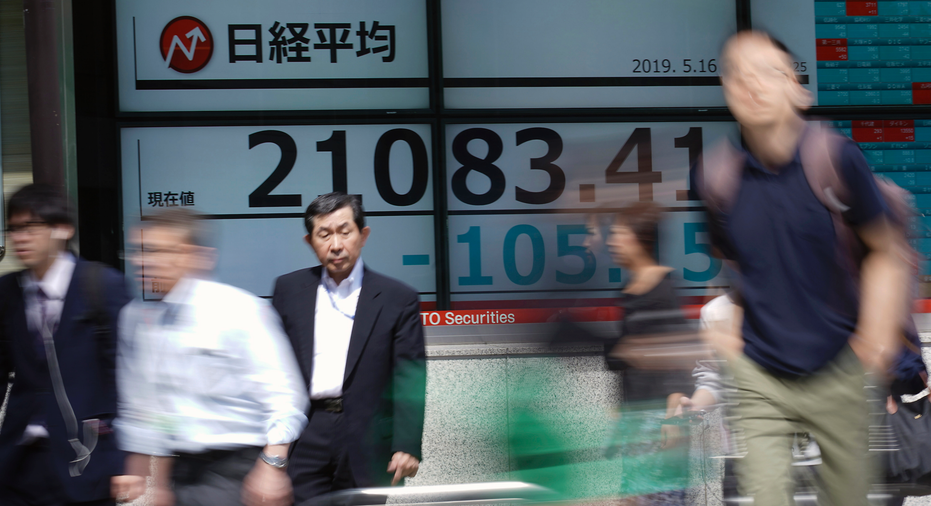Stocks resilient in face of latest US trade moves
People walk past an electronic stock board showing Japan's Nikkei 225 index at a securities firm in Tokyo Thursday, May 16, 2019. Asian shares were mixed Thursday as worries remained about trade tensions, tempered by media reports that President Donald Trump may delay a decision on auto tariffs. (AP Photo/Eugene Hoshiko)
LONDON – Stocks recovered their poise Thursday after dropping over President Donald Trump's decision to limit U.S. exports to foreign telecoms companies, an order that appeared aimed squarely at China.
In Europe, Germany's DAX was up 0.9% to 12,204 while the FTSE 100 index of leading British shares rose 0.3% to 7,391. The CAC 40 in France was 0.4% higher at 5,397. U.S. stocks were also poised to open modestly higher, with Dow futures and the broader S&P 500 futures up 0.3%.
Stocks have been volatile all week amid conflicting signals over the U.S.'s trade position. Some comments from the Trump administration have been positive for stocks, while others have shaken markets.
On Thursday, China protested the Trump administration's decision to issue an executive order apparently aimed at banning equipment sold by telecoms gear maker Huawei from U.S. networks. It also subjected the Chinese company to strict controls on U.S. exports.
Huawei, the biggest global maker of switching equipment for phone and internet companies, has spent a decade fighting accusations it facilitates Chinese spying.
Markets have swung wildly in recent weeks as trade tensions between the U.S. and China intensified. The Trump administration more than doubled tariffs on $200 billion in Chinese imports and spelled out plans to target the $300 billion worth that aren't already facing 25% taxes. The escalation covers everything from sneakers to toasters to billiard balls. The Chinese have retaliated by hiking tariffs on $60 billion in U.S. imports.
It's not been all bleak, though, with some traders, particularly in Europe, focusing on a potential U.S. decision to postpone tariffs on cars.
"It is remarkable how the stock markets have managed to hold their own rather well considering everything that's happened, from the escalation of U.S.-China trade war to renewed fears over global growth," said Fawad Razaqzada, a technical analyst at FOREX.com.
"When the market is able to absorb so much negativity, it is usually a sign of strength. So I wouldn't bet against the S&P hitting another record high in the coming days, even if we think the markets are overvalued at current levels."
Markets were bolstered Wednesday by reports that the White House plans to delay a decision about imposing tariffs on autos from Europe and elsewhere by up to six months. A decision was due by Saturday.
CNBC, quoting unnamed sources, said that the administration was close to announcing a postponement of the auto tariffs for up to six months. The administration sees the threat of the auto tariffs as a way to gain leverage over trading partners such as the European Union and Japan in ongoing trade talks.
Sentiment was also buoyed by reassurances on trade from U.S. Treasury Secretary Steven Mnuchin. Mnuchin said he and U.S. Trade Representative Robert Lighthizer were planning to travel to Beijing for more talks. Details of such negotiations have not been announced by the Chinese side.
Earlier, in Asia, Japan's benchmark Nikkei 225 slipped 0.6% to finish at 21,062.98. South Korea's Kospi dipped 1.2% at 2,067.69. Australia's S&P/ASX 200 gained 0.7% to 6,327.80. Hong Kong's Hang Seng was little changed, inching up less than 0.1% to 28,275.07, while the Shanghai Composite added 0.6% to 2,955.71.
ENERGY: Benchmark U.S. crude advanced 70 cents to $62.73 a barrel in electronic trading on the New York Mercantile Exchange while Brent crude, the international standard, added 64 cents to trade at $72.41 per barrel.
CURRENCIES: The euro was flat at $1.12 while the dollar was steady at 109.62 yen.





















